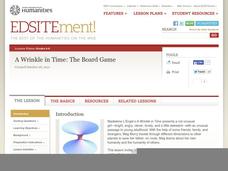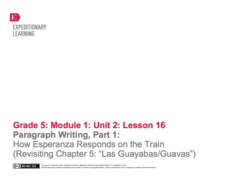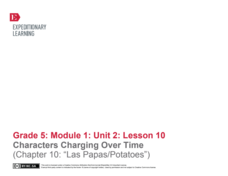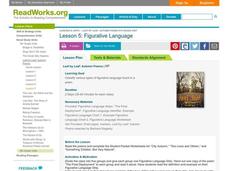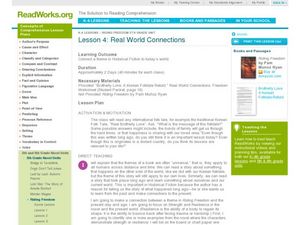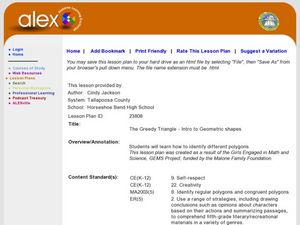National Endowment for the Humanities
A Wrinkle in Time: The Board Game
Tackle some big questions about A Wrinkle in Time by Madeleine L'Engle with a board game project. As learners brainstorm for and complete their board games, they consider what helps and hinders Meg on her journey and why she succeeds in...
McGraw Hill
Study Guide for Island of the Blue Dolphins
Dive your class into a reading of Island of the Blue Dolphins with this in-depth study guide. Breaking the novel into three parts, the resource begins each section with a focus activity that identifies a specific theme or question to be...
EngageNY
End-Of-Unit 2 Assessment: On-Demand Analytical Essay About How Esperanza Changes Over Time
Close the unit on Esperanza Rising with an in-class analytic essay on how Esperanza changes over the course of the novel. Writers can use any of their notes and work from the unit as well as their drafts of the first two paragraphs of...
EngageNY
Paragraph Writing, Part II
Come up with a list of requirements for this expository essay on Esperanza's character in Esperanza Rising as a class and use the list to guide class writing. Here, learners will complete the first paragraph, discuss their notes for the...
EngageNY
Paragraph Writing, Part 1: How Esperanza Responds on the Train (Revisiting Chapter 5: "Las Guayabas/Guavas")
When your class members have completed the novel Esperanza Rising, they will be ready to write an expository essay on how Esperanza responds to events and what this says about her character. Set your pupils up for success by starting out...
EngageNY
Revisiting Big Metaphors and Themes: Revising and Beginning to Perform Two-Voice Poems
Now that your class has read all of Esperanza Rising, take the time to tackle big metaphors and themes. Pupils will participate in an activity called Chalk Talk, in which they circulate around the room in small groups and add comments to...
EngageNY
Building Background Knowledge: Why Do Workers Strike? (Chapter 11: "Los Aguacates/Avocados")
Make connections between Esperanza Rising and human rights with the activities outlined here. The instructional activity starts out with a brief quiz and review of the novel. After that, pupils circulate and share quote strips that you...
EngageNY
Mid-Unit Assessment and Discussing Themes in Esperanza Rising: (Chapter 9: "Las Ciruelas/PLums")
Give this skills-based assessment halfway through your unit on Esperanza Rising. After a brief review, class members take the test, which asks them to show that they know how to analyze the novel independently. They are asked to...
EngageNY
Characters Changing Over Time (Chapter 10: "Las Papas/Potatos")
Engage further in Esperanza Rising with a focus on close reading and metaphor. Class members zero in on the tenth chapter, examining characters and big ideas. Pupils discuss the text in small groups and as a whole class, and participate...
EngageNY
Understanding Themes in Esperanza Rising
Determining a theme or central idea is greatly emphasized in the Common Core standards. Target that skill though big metaphors and central symbols in Pam Muñoz Ryan's Esperanza Rising. Help your class reach the standard through...
EngageNY
Building Background Knowledge: Learning About the Historical and Geographical Setting of Esperanza Rising (Chapter 1: “Aguascalientes, Mexico, 1924”)
Set up your class to read Esperanza Rising, by Pam Muñoz Ryan, through a class read-aloud and exploration of the setting. The detailed instructional activity outlines each step. First, class members read over the first few pages and...
Curated OER
Genre Lesson: Poetry
Here is a terrific lesson on poetry! Learners bring in the lyrics to their favorite song. A class discussion ensues regarding what makes a song "catchy." After analyzing the alliteration of the poems, learners read the poem "This...
Curated OER
Genre Lesson: Biography/Autobiography
Practice distinguishing biography from autobiography through point of view. Tell a brief story of your morning. Have a class member retell the story to you (using second person). And have another retell the story to the class (using...
Read Works
Figurative Language
Do your learners need to practice identifying figurative language? This activity outlines a method for working on that tricky skill. After teacher modeling and think-aloud, fourth and fifth graders identify examples of figurative...
Curated OER
Genre Lesson: Poetry
Hook kids into a study on poetry elements by asking them to bring in the lyrics to their favorite song. Discuss the elements in one or two songs (preferably that demonstrate rhyme, figurative language, or a repeating phrase). Groups do...
Curated OER
Real World Connections
Explore universal themes in literature with a literacy and multicultural awareness instructional activity. Elementary and middle schoolers make real world connections between themes in books from several cultures. They make inferences...
Curated OER
Comparing Two Stories
Compare new and old versions of the classic story Alice in Wonderland in this comprehensive worksheet packet. Learners read an excerpt from the original, answering several analysis questions. They do the same for a more modern version,...
Curated OER
The Effects of Character Decisions
Learners explore characters' decisions. They play a card game in which they match a decision card with a direct effect card. Then they examine characters from The Wizard of Oz, record important decisions that they make on index cards,...
Curated OER
Lesson 4: Theme Matters
This useful approach to determining themes based on specific details from a book is aimed at readers of Jerry Spinelli's Maniac Magee. It could also easily be adapted for use with other books or readings. The class identifies recurring...
Curated OER
Note-Taking: K.I.S.S. "Keep It Short and Simple"
Note-taking is an essential study skill, and it needs to be taught! In the context of a research project on energy sources, learners find multiple sources, evaluating, paraphrasing, and citing them correctly. Two lists with note-taking...
Curated OER
Deciding Theme
Read aloud to your class the fable "The Lion and the Mouse" as you explore characters' choices and the effects they have on a story. Apply what is discussed to finding a theme of the chapter "Not Giving Up" from The Wizard of Oz.
Curated OER
The Greedy Triangle-Intro to Geometric Shapes
In this geometry lesson, learners read The Greedy Triangle and use geoboards to construct geometric shapes. They identify the number of sides and angles each shape has.
Curated OER
Theme Matters
Fifth graders read to find the purpose of a piece of writing. They explore the theme of Bridge to Terabithia through events in the story. Furthermore, they consider how they would find a theme and examine a new text for its theme.
Curated OER
Lesson 3: A Poem's Theme
Leaf by Leaf: Autumn Poems by Barbara Rogasky is the foundation of this lesson on theme identification. Critical thinkers read three different poems from the book then attempt to find the message the author is sending her readers. They...


